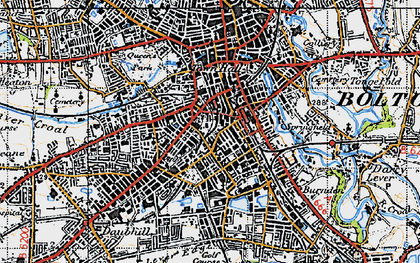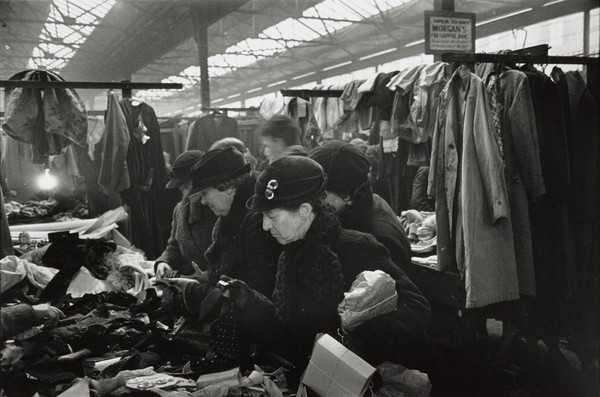Mass Observation Worktown Study: Food and Shopping Survey, 1939 (Reel 26, Box 32B and 32A)
The Survey
This survey was carried out between June 12 and August 25 1939.
June dates survey undertaken: 12, 13, 14, 15, 19, 26,
July: 7, 15, 25, 27, 28
August: 1, 3, 7, 9, 10, 15, 16, 18, 21, 23, 24, 25.
It was curtailed by rumours of war. The Nazi/Soviet pact was signed on 23 August, war being inevitable after that. Once declared volunteers such as Gertrud Wagner and Water Hood left immediately whilst the remaining MO people investigated people’s responses to wartime conditions.
The Volunteers and those Interviewed
A number of volunteers were involved in the Food and Shopping Survey: Rita R (Local woman), SS (Stella Schofield?), Barbara Smethurst, Gertrud Wagner and Walter Hood. People known by initials only included IP and BHI. Walter Hood was in nominal charge of the project.
There are reports of interviews with 61 women (only women), interviews seemingly taking place in women’s homes. Streets where the interviewees lived include:

Astley Bridge/Sharples: Kimberley Rd, Florence Avenue
Daubhill, Great Lever and Hunger Hill: Steele Street, Peace Street, High Street, Swan Lane, Derby Street, Robert Stanley Street, Leach Street, Bridgman Street, Normanby Street, Howcroft Street, Hinkler Avenue.
Deane: Wigan Rd, Willows Lane
Halliwell: Chester Street, Glen Bott Street, Cloister Street, Oxford Grove
Barrow Bridge: 104 Moss Lane,
Over Hulton: Newbrooke Rd
Heaton: Hereford Road
Farnworth: Arondale, Plodder Lane, Leinster Street, Brookhouse Avenue
School Hill: Davenport Street
Tonge Moor/Tonge Fold: Parkdale Street
Sixteen women were named with addresses attached:
| Mrs Warburton, 62 Hereford Rd | Mrs Sedon, 55 Newbrooke Rd | Mrs Greenhalgh, 25 Kimberley Rd |
| Mrs Jenkinson, 35 Cloister St, Halliwell | Mrs Catherall, 26 Florence Avenue, Astley Bridge | Miss Newton, 9 Brookhouse Avenue (Farnworth) |
| Mrs Mosswell, 10 Arondale (?) Farnworth | Mrs Whitehead, 430 Wigan Rd (Deane) | Mrs Hulme, 16 Leinster St (Farnworth) |
| Mrs Watham, 314, Willows Lane (Deane) | ??? 505 Plodder Lane, Farnworth | |
| Mrs Brecknell, 254, Oxford Grove (Chorley old Rd/Halliwell) | Nuttalls, 270, Oxford Grove, Chorley Old Rd/Halliwell | Mrs Willis, 20 Parkdale Road, (off Thicketford Road, down from Tonge Moor) |
| Mrs Duckworth, Davenport Street, (School Hill), |
Most of the streets were terraces, but many were of the ‘better’ type, with a sliver of front garden and Accrington Brick facing. The spread of interviewees across town is impressive. We do not know how the women were chosen, but it may be that either an advert in the BEN asked for volunteers (in exchange for five shillings or a similar amount), or much more likely that the range of local contacts MO had, suggested people. So for instance a lot of people interviewed are near Derby Street. One of the contacts was Bill Naughton, whose mother and sister lived just off Derby Street, so would have known people around there: but neither Naughton’s mother nor sister were interviewed. Mrs Duckworth was a neighbour of MO, friendly with the people at 85 Davenport Street.
The Questions
You’ll note that the questions listed below do not match the answers of the example given below. Several versions of the questions were used and also different interviewers concentrated on different aspects of life. In broad terms though the questions below cover the ground. At the head of many survey responses the interviewer almost invariably notes the family income.
- Who gets up first in the house each morning? What time do you get up and your husband and children? Do you have a nap during the day?
- What is your first task of the day? Who undertakes what tasks in the household?
- Do you have a weekly routine for cleaning/washing? What is it?
- What free time do you have and what do you do with it? Do you get out of the house?
- Where do you shop and how long does it take? Do you shop locally or in town? Do you ‘window’ shop?
- What do you buy from which shop? Do you have a favourite shop for particular purchases? What food do you buy on a regular basis and how much of it? Do you buy sweets, drink or cigarettes? (responses here were often very detailed).
- What time is breakfast and lunch (not called dinner in the questionnaires), tea and supper.
- What typically would meals consist of? (this is often responded to in great detail) and what food are preferred in the household.
- What time do you go to bed and do you dream?
- Some respondents were obviously asked about meat, fish and fat consumption, including which bacon they preferred, what fat they used for baking, use of lard, beef dripping, butter, margarine (perhaps this was some sort of commercial contract MO had to find out people’s preferences – seems an odd preoccupation otherwise).
- Detail about clothes washing regime included what soap flakes were used, drying etc
- What do you do at the weekends, what are your leisure pursuits or hobbies? Do you go to church, which one and how often?
An example of a response
Mrs Catherall, upper working class husband scoutmaster, 26 Florence Avenue, small baby 11 weeks
1. M. Washing only their own cloth since baby arrived. Sheets go out to laundry. Baby things are washed every day
T. tidying about
W upstairs
Thursday and Friday round here downstairs
3. Now it has to be short. I have to push it where I can. Take baby with me.
5. likes shopping the only outing a woman gets has to combine shopping with ones pleasure
7. Go always to some shops, when I have found out which are good I stick to them
12. We have three meals and a small supper, of course I drink more now… with feeding baby
13. for Sunday we sometimes have a joint but it is rather too much for us we are very small eaters
14. we have at least once a week fish, fresh fruit rather a lot; 4 – 5 ilb of potatoes, 9 oranges and 2lbs of apples buys vegetables everyday uses butter for bread margarine only for cooking
15. same diet as my mothers only we eat bread did at first for health reasons and because we like it have a pint and a gill of milk everyday
16. Needs about 25/- – 27/6 a week for food
17 goes sometimes to M and S e.g. the overall she wears is from there would not go for things which should last but goes for things which should be cheap.
This example is fairly brief, typical in some respects. Mr Catherall at that time had a weekly column about scouting in the BEN, and had had one children’s novel published. Arthur Catherall carried on writing and in the end had 106 children’s books published, selling over million books with Dent as his publisher. The baby here, Ruth Parker, grew up to be a teacher and still lives in Sharples.
Findings
Many of the reports include quite detail verging on the intimate, husband’s medical condition, hints at frustration in their lives. This indicates to me that the interviewers were either very skilled or local women. The focus is very clearly food and the pattern of the day. There is little mention of children, none of paid work the women might do or have done, nor mention of managing the fires or washing or making their own and children’s clothes, which was a general feature of life at the time.

All the women, mostly ‘housewives’, had a very clear sense of their role and responsibility in running the household. There were no ‘shared’ domestic duties mentioned and some mentioned meeting their husband’s dietary wishes. Each had shops they went to habitually, knew exactly how to budget for food on the income they had and often too had a clear idea of the meals to be prepared each day. (The interviews were conducted just before rationing was introduced and sheds light on how and why rationing ‘worked’. The system required everybody to identify a specific grocer and greengrocer. For people here this would have presented little problem as everybody already had regular shops they used).
Many also mentioned a routine of cleaning particular parts of the house on specific days – though I must say I did wonder here if the women responded to a specific question in a way they thought the interviewer might expect/like. They each shopped every day locally, often talking of a trip to town as on a special occasion or for more expensive items, such as an overcoat or children’s shoes.
The interviewees talked about what food was bought, what meals consisted of and their husband’s preferences in great detail – ‘we eat a lot of fruit’, ‘and sweets, he doesn’t smoke of drink, so he likes a lot of sweets’. Leisure, if mentioned at all was a snatched hour or two during the week and ‘walking’, visiting relatives or church at the weekend. No one mentioned the pub and only a few mentioned the cinema. This is interesting as we know that Bolton women were inveterate film goers – perhaps moreso when younger or single, or perhaps, as indicated previously, the women were putting on a bit of a housewifely show for the interviewer. One thing is mentioned in more or less all the interviews and that is the use of butter, margarine or lard in cooking and their diet generally. The focus on this seems determined and I wonder if Mass Observation had a contract with, say Unilever, to check on use of such items. Perhaps not.
The overall impression is of people who had a clear sense of the relationship between what their income was, what they could afford and what they, and their husband’s, preferred – who generally had a considered approach to the role of housewife, which they took for granted, accepted and seemed content with.
Dave Burnham, for Live from Worktown.
Click on the button below to go back to the MO Contents page.
